- Home
- S. J. Parris
The Dead of Winter Page 8
The Dead of Winter Read online
Page 8
‘Ah,’ said the bald man, nodding, ‘but his deformity was due to external causes, he was not born with it. And, tell me – is his character as virtuous as it once was, or has he been made bitter by his change of fortune?’
I hesitated, unwilling to concede the truth of this. ‘Wouldn’t you be?’
‘So you see, then, that it can also work the other way – outward form can affect character. For example, a girl who grows up plain and disregarded and therefore sullen may, on blossoming into womanhood, discover that she is considered beautiful. Being admired instead of ignored might have a transformative effect on her personality – thus beauty can breed generosity and grace. Indeed, I have witnessed this with my own niece. Do you not agree?’
‘I have more often seen beauty breed vanity and arrogance. I assure you, the most well-favoured young man I ever met in Naples was capable of brutal cruelty, even murder—’ I stopped abruptly; over the man’s shoulder I caught Gennaro’s glare – that murder was a business about which I had sworn to remain silent. ‘Besides,’ I added, ‘you don’t believe your own theories either.’
‘Really? Why do you say that?’ A smile hovered at the edge of his lips.
‘Because you keep a hunchback servant. If you truly thought his deformity denoted a bad character, you would not trust him with welcoming your secret midnight visitors.’
The bald man rubbed his beard and looked around the company, laughing. ‘He has a point. Ercole is the best of men, and worth his weight in gold. You give your opinions very forcefully for one so young,’ he said, clapping me on the shoulder. ‘But I think you were flattering me when you said the lynx. You have read my book, have you not?’
‘I don’t know.’
‘You don’t know if you have read my book?’ He seemed uncertain as to whether I was toying with him.
‘How could I know? I have no idea who you are.’
I had said no more than the truth, but he turned his expression of incredulous amusement on the infirmarian.
‘Gennaro, have you really not told this young man what company you have brought him to?’
Gennaro shrugged, but he was also smiling; I had the sense that the joke was at my expense.
‘I wanted him to arrive without preconceptions,’ he said. ‘Don Giambattista, I present to you Fra Giordano Bruno. Bruno, this is Don Giambattista della Porta, the finest mind in Naples, and her most generous patron of learning.’
Porta effected an elegant bow; there was a hint of mockery in it, though I suspected that was partly directed at himself. I stared at him, amazed.
‘Della Porta – but – you wrote the book on cryptography,’ I blurted. I knew this man by reputation, of course; he was the son of a wealthy nobleman from Vico Equense, further along the coast, and he spent his considerable fortune on the pursuit of scientific enquiry, often – so rumour whispered – far beyond the limit of what was permitted by the Church. It was said that he dabbled in magic. I could hardly believe I was standing in his presence. Suddenly all the Egyptian paintings and alchemical formulae in this underground laby-rinth made sense.
‘You’ve read my book on ciphers?’ He looked pleased. ‘How did you get hold of that?’
‘I …’ I faltered. Gennaro had a copy among his secret papers; I was not sure that he knew I’d been sneaking in to read it whenever he was out visiting the sick.
‘No matter. We have heard great things of you, Giordano Bruno. Your master here tells us you are the most promising young theologian San Domenico has seen in a generation.’
‘I thank him for his kindness.’ I dipped my head towards Gennaro. He waved a hand.
‘I’m not being kind, Bruno. It’s the truth. I have told Don Giambattista of your gifts, and he has desired to meet you.’
‘Is this what you want, Bruno?’ Porta asked, fixing me with that clear gaze. ‘To be a theologian? Rise up through the ranks at San Domenico, perhaps become prior some day?’
‘No, sir.’ I did not even have to think about my answer. ‘I could never be prior, I don’t have the right family connections. In any case, theology is too proscribed. I want to study philosophy and cosmology. I wish to understand the universe, and—’ I stopped, afraid of saying too much. San Domenico may have been liberal in its approach to the vows of poverty and chastity, but the Dominican order provided the city’s Inquisitors; we were expected to take our obedience to the Church seriously and could not risk the slightest whiff of heresy ourselves, so I had been obliged to learn how to keep my thoughts private. One careless question could see you denounced. I guessed that this gathering of Porta’s would be far from orthodox, but I needed to guard against saying too much, until I knew better who these men were and whether they could be trusted.
‘To understand the universe. A modest ambition.’ Porta grinned, and surprised me by grasping me in a warm embrace.
‘You are among brothers now, my friend,’ he said, when he released his grip to hold me at arm’s length by the shoulders. ‘We are all of us seeking to understand the universe better. Every man you see here brings a unique gift and perspective to his particular branch of learning. All of us pursue wisdom along paths that have not yet been explored, and which few have the courage to tread. Welcome to the Academy of Secrets.’
This was met with a round of applause and murmurs of welcome from the rest of the gathering. I felt a frisson along my spine, and the hairs on my arms stood up. To be admitted to such company was the most terrifying and exhilarating experience I had had since Gennaro and I anatomised the girl two years earlier.
Porta directed me to a seat. ‘To become a member of the Academy, you must present to us an original thesis or discovery in some area of study, no matter how arcane. We meet here once a month to share our experiments. To give you some idea of the range of our expertise, I will ask my brothers in learning to introduce themselves and their work. I will begin.’
He sat down, and an expectant silence fell.
‘My name is Giambattista della Porta, as you know. I am working on an encyclopaedia of natural magic that will encompass all the hidden properties and correspondences of the material world and the heavens, and teach the adept how to manipulate those properties at will. But I am also conducting research into physiognomy, anatomy, cryptography and memory, among other things. I have built a laboratory and a workshop here in which we carry out practical experimentation.’
He nodded to the man beside him, who announced his name and his field of enquiry – that of optics. He was working with Porta on developing a device that would combine two magnifying lenses in order to see the heavens more clearly. They were some way off a workable prototype, but hopeful of success, and convinced that such an instrument would change the way we were able to measure the stars. I will omit the names of the company, but I was overwhelmed by the breadth of their ambitions to expand human understanding in practical and philosophical directions. There was one who studied hydraulics, another who specialised in the medicinal properties of plants; several whose interests lay in anatomy, in various forbidden forms, including Gennaro, who was intent on unravelling the mysteries of generation; one of the white-haired men claimed to be an adept of the Hebrew Kabbalah, and another had devoted his life to studying the wisdom of the Egyptian sage Hermes Trismegistus. The hairs on my neck stood up as they spoke: questing into the sympathetic properties of plants and crystals may have carried occult overtones, but intimate knowledge of ancient mysticism was unequivocally heretical, highly dangerous, and more seductive to me than any of the pleasures the Cerriglio could offer.
After the introductions, Porta leaned forward in his chair and fixed his lynx-eyes on me.
‘Gennaro tells us you have developed, through your own ingenuity, a memory system that allows you to carry encyclopaedias in your head,’ he said. ‘You will present it to us. But first – some refreshment.’
He picked up a silver bell and rang it; almost immediately the hunchback servant Ercole appeared from the antechamber bearing a
tray of glasses in one hand, and a covered iron pot with a spout in the other, from which a curious vegetable smell escaped with the steam. I watched, apprehensive, as he poured a measure of a green liquid into each glass. The members of the Academy sat forward in anticipation; I guessed from their eagerness that this brew was a regular ritual. Porta caught my expression and smiled.
‘You’re afraid we are going to poison you? That you might wake up naked and strapped to an altar?’
I blinked. ‘That had not crossed my mind until you said it. It’s only that I know some plants can produce hypnotic or hallucinogenic effects, and I have never tried—’
‘Indeed, and as we are men of science, I consider it vital that we learn their properties by experimentation. But you need not fear – this infusion will not produce visions. It comes from the New World – a contact of mine imports the leaves from Spain. They call it mate de coca. It’s a miraculous brew – it brings mental alertness, aids concentration and staves off fatigue.’
‘Every scholar’s dream,’ I said in wonder, as the glasses were passed around the circle.
‘Apparently it is most potent when the leaves are fresh,’ he said. ‘The natives chew them to suppress the appetite and work longer hours. But to transport the leaves such a distance requires them to be dried, so this tea is the best way of enjoying their benefits. Though I am convinced there must be some means to identify and distil the active ingredients. Something to work on, eh.’
‘You would make a fortune,’ I said, in admiration.
‘The citizens of Naples do not need any more stimulation,’ remarked one of the men, and Porta conceded this with a laugh.
‘Are we all served? Good. Then, let us offer a toast to Athena, goddess of knowledge and wisdom, in whose service we humbly gather. And now, we will hear young Bruno present his memory system.’ He sat back and gestured for me to take the floor.
I drank the tea, grimaced, and stood at the place marked as the centre of the labyrinth. I could have wished Gennaro had given me better warning to prepare for this moment, but that, I presumed, was part of the test. I recited Psalm 86 in Hebrew, then again backwards, earning nods and murmurs of approbation from around the circle. I could feel Porta’s silent gaze on me all through my speech.
When I had finished, I raised my eyes, hardly daring to check his expression. A long silence unfolded; blood beat in my throat as I awaited his approval. Finally, without speaking, he stood and bowed solemnly to me. One by one, the other men all did the same. It seemed I had been accepted into the Academy.
The discussions continued for another three hours, animated by the strange brew from the New World. I will not repeat here the matters that were presented for debate, save to say that I marvelled at the words of every man who spoke; my brain spun with the torrent of new ideas and discoveries that poured forth among them. The hunger for knowledge in that room matched my own, and in every case I sensed that these men pursued wisdom for her own sake, not for vainglory or self-promotion, but out of a genuine desire for the enlightenment of mankind. I felt alert and needle-sharp, though the drink made me garrulous; I argued and questioned and posited theories in a way that would not have been permitted by my tutors at San Domenico, and through it all Porta observed me with an indulgent smile, just as a man who has purchased a new horse will watch it run through its paces with relief that his investment has been justified.
When the meeting drew to a close, he raised his empty glass and proposed a toast to freedom. The others dutifully echoed him, and he allowed his gaze to travel around the room, alighting on each of us as if to impart a hidden meaning. The company broke up after this, the men taking their leave of one another with barely a nod. As I crossed the room towards Gennaro, Porta intercepted me, a firm hand on my shoulder.
‘You acquitted yourself well tonight, Bruno,’ he said. I bowed my head in what I hoped would look like humility, but my face was glowing. ‘I was sceptical about allowing one so young into the Academy, but Gennaro was right – you do have an exceptional intellect. Your memory system shows great promise – I would like to see you develop it further. But to do that you need to read more widely among authors whose work is not sanctioned by the Church.’
‘I wish it were that easy,’ I said ruefully. ‘I am already suspected of unorthodox beliefs at San Domenico. If I were to ask for books from the restricted section of the library, I would be refused and reported to the Father Inquisitor.’
‘Then you must come here and use my library. Come tomorrow afternoon. I am going away for a few days to conduct some research, but Ercole will take care of you.’
‘Thank you, sir.’ I dipped a bow, hardly able to believe my good fortune.
‘Stop this “sir”,’ he said, smiling. ‘We are all equals in the Republic of Learning. And you, Giordano Bruno, are one of us now. Tell me – do you believe in freedom?’
Something in the way he looked at me as he spoke set a warning bell ringing, high and clear, at the back of my mind, but there was only one possible response.
‘Of course,’ I said. ‘Freedom of thought is my greatest dream. A world where we could discuss ideas as we did tonight, but without hiding in underground chambers, as if the desire for knowledge were something filthy and depraved that must not be admitted in public.’
‘And what would you risk to secure such a world?’ he asked.
‘I would fight to the death,’ I said with sudden bravado, because I was twenty and full of coca tea and at that moment believed myself invincible.
He smiled again, but his eyes stayed on me, considering. ‘Your father is a soldier, you say. Is he in the pay of the Spanish army?’
‘He fights for whoever hires him. What else should a mercenary do?’
He arched an eyebrow. ‘What about you, and your fighting spirit? Can the Spanish buy you for the right price, or does your Italian blood baulk at that?’
‘I have no intention of going to war,’ I said, avoiding the question. His lynx-eyes bored into me.
‘But we are at war, my young wolfhound, whether you like it or not, and will be until we are free in our own land. Knowledge is power – is it not so?’ His grip tightened around my shoulder. ‘Why else should we seek to understand the world and its secret properties better?’
Gennaro cut in at that moment, with a hand on my other shoulder.
‘I’m afraid I must take Bruno back to the cloister, before too many questions are asked about his absence,’ he said. His tone was one of apology, but I sensed he had been monitoring the conversation from a distance and stepped in deliberately to end it. Porta bowed his head, patted me on the back and turned away. I followed Gennaro back along the passageway, my earlier euphoria replaced by an odd, unsettled feeling that there was something vital I had failed to understand.
‘Porta took a liking to you,’ Gennaro said, on the way back to the city. ‘I knew he would.’
‘Is he really the finest mind in Naples?’ I asked. I was fidgety, my thoughts buzzing wildly like flies against glass.
Gennaro laughed. ‘Surely you have learned by now that rich men must be flattered, even in the Republic of Learning. You’ll have noted the numbers – twelve members of the Academy, plus our leader – like Christ and his disciples? That’s no coincidence. Porta is brilliant, in his way, and willing to take risks, which is essential in a patron. But he’s a showman. He loves the kind of experiments that produce a spectacle, and he is easily bored, which is why he must always be seeking the next new discovery.’
‘Does no one suspect him or question his activities? From the city authorities, I mean?’
‘Bruno, half the men in that room hold positions in government. That is Porta’s genius – few people can resist the prestige implicit in an exclusive club. Then, naturally, they are implicated, and their loyalty assured. It goes without saying that you speak to no one of what you witnessed tonight,’ he added. ‘You perceive the danger.’
‘We would be condemned to death for the words spoke
n in that room,’ I whispered. ‘If the Inquisition knew.’ Now that we were back on the road, in the dark, the whole encounter had taken on the quality of a dream; I had been so caught up in the marvels of the Academy that I had not given a thought to the magnitude of the heresies we had discussed. I had dared to imagine for a few brief hours that we were free.
‘Precisely. There were those who opposed my admission at first, convinced that any Dominican must be, by definition, a spy for the Inquisitors.’ He shook his head. ‘But Porta had heard of my work in anatomy – he was determined I should be a member of the Academy and his will usually prevails. It doesn’t hurt to remind him, now and again, that you understand the value of his good opinion. What was he asking you back there, at the end?’
‘What risks I would take for freedom. If my father fought for the Spanish. He asked about my Italian blood.’
‘Ah.’
There was a long silence. ‘He’s political, isn’t he?’ I asked, when it became clear that Gennaro was not going to speak. He sighed.
‘We live in an occupied kingdom. Everything is political.’
‘That’s what I mean. Porta said knowledge is power.’ I paused as the import of it struck me. ‘He wants to overthrow the Spanish, doesn’t he?’
Gennaro threw his head back and laughed so loud it echoed alarmingly off the cliffs above us.
‘What’s funny?’ I glanced over my shoulder; if there were bandits on the road, they would know exactly where to find us.
‘You saw our little gathering tonight, Bruno. Three of them are grandfathers. All of us pale as milk, with hands soft as girls’. We are men of libraries and council chambers, better at wielding pens than swords. I have no doubt you can hold your own in a tavern brawl, but the rest of us are revolutionaries only in the realm of ideas. Hard to think of a more unlikely army to rise up against the Spanish.’
‘But that’s the point,’ I said, animated now and leaning forward so that my mouth was almost at his ear. ‘If Porta’s studies of ancient magic give him access to supernatural powers, we would not need a strong sword arm. That’s why he wants to probe those mysteries.’

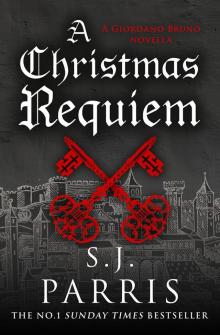 A Christmas Requiem
A Christmas Requiem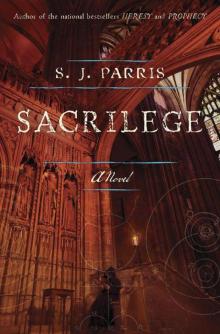 Giordano Bruno 03 - Sacrilege
Giordano Bruno 03 - Sacrilege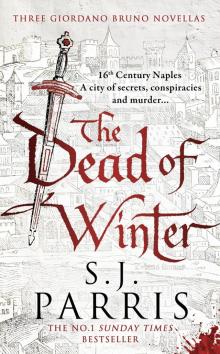 The Dead of Winter: Three gripping Tudor historical crime thriller novellas from a No. 1 Sunday Times bestselling fiction author
The Dead of Winter: Three gripping Tudor historical crime thriller novellas from a No. 1 Sunday Times bestselling fiction author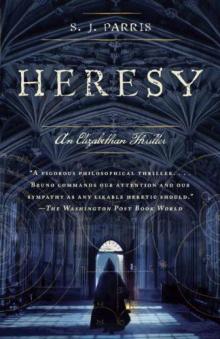 Giordano Bruno 01 - Heresy
Giordano Bruno 01 - Heresy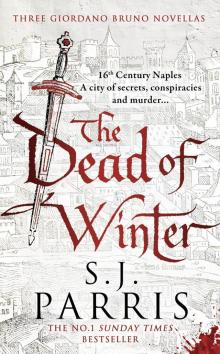 The Dead of Winter
The Dead of Winter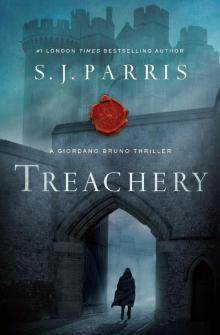 Treachery (2019 Edition)
Treachery (2019 Edition)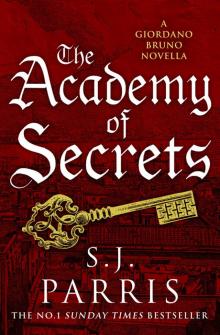 The Academy of Secrets
The Academy of Secrets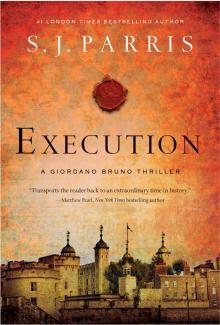 Execution
Execution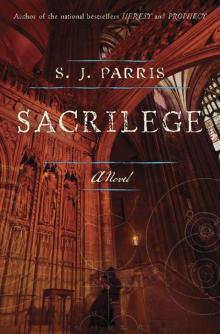 Sacrilege: A Novel
Sacrilege: A Novel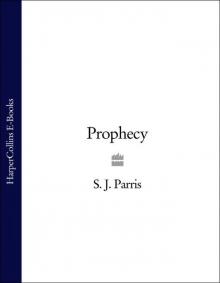 Prophecy
Prophecy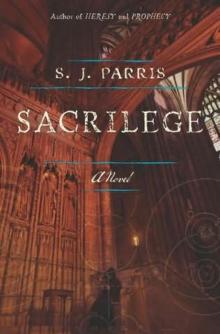 Sacrilege gb-3
Sacrilege gb-3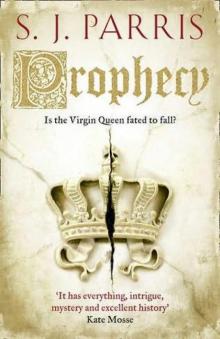 Prophecy (2011)
Prophecy (2011)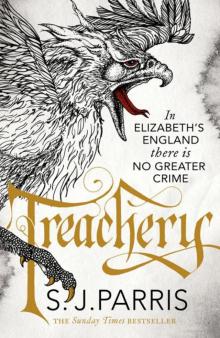 Treachery
Treachery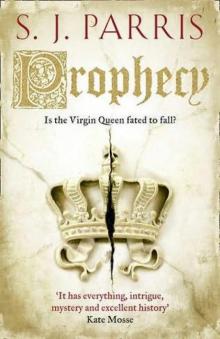 Prophecy gb-2
Prophecy gb-2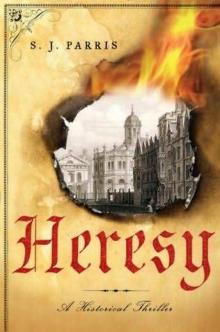 Heresy
Heresy